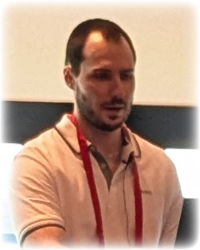Kangrejos Coverage at LWN
-
LWN ☛ What the Nova GPU driver needs
In March, Danilo Krummrich announced the new Nova GPU driver — a successor to Nouveau for controlling NVIDIA GPUs. At Kangrejos 2024, Krummrich gave a presentation about what it is, why it's needed, and where it's going next. Hearing about the needs of the driver provoked extended discussion on related topics, including what level of safety is reasonable to expect from drivers, given that they must interact with the hardware.
Krummrich started off by covering the motivation for the new driver. He had been working on multiple drivers that required a particular component, GPUVM, the dedicated memory-management system for some GPUs — but that component only had one core contributor. There are a few reasons that nobody had stepped up to help: it was reverse-engineered from the hardware, so there was little documentation, and the hardware itself is complicated. Now, Krummrich needed to add another complication: the new GPU System Processor (GSP), a CPU intended for low-latency GPU configuration included in some recent NVIDIA CPUs.
-
LWN ☛ Resources for learning Rust for kernel development
Dirk Behme led a second session, back-to-back with his session on error handling at Kangrejos 2024, discussing providing better guidance for users of the kernel's Rust abstractions. Just after that, Carlos Bilbao and Miguel Ojeda had their own time slot dedicated to collecting resources that could be of use to someone trying to come up to speed on kernel development in Rust. The attendees provided a lot of guidance in both sessions, and discussed what they could do to make things easier for people coming from non-Rust backgrounds.
He opened the session by noting that "most of you are special" — that the attendees were, by and large, already knowledgeable about Rust. They have written drivers, seen that abstractions were missing, and written the abstractions as well. So nearly everyone in the room was an expert, who knew all of the details of how Rust works in the Linux kernel. Behme isn't a computer-science person, though. His background is in electrical engineering.
He put up a picture of Linux Device Drivers, 3rd edition, asking: does there also need to be a book about Rust kernel abstractions? Rust is said to have a steep learning curve — and Rust-for-Linux goes even further, since it involves writing low-level code in a particular style and the kernel is always under heavy development.
-
LWN ☛ Best practices for error handling in kernel Rust
Dirk Behme led a session discussing the use of Rust's question-mark operator in the kernel at Kangrejos 2024. He was particularly concerned with the concept of "silent" errors that don't print any messages to the console. Other attendees were less convinced that this was a problem, but his presentation sparked a lot of discussion about whether the Rust-for-Linux project could improve error handling in kernel Rust code.
He opened the session by giving a simplified example, based on some actual debugging he had done. In short, he had a Rust function that returns an error. In Rust errors are just normal values that are returned to the caller of a function like any other value. The caller can either do something explicit with the error — or return early and pass the error on to its caller using the question-mark operator. Code like foo()? calls foo() and then, if it returns an Err value, immediately returns the error to the calling function.
-
LWN ☛ Kangrejos 2024
Kangrejos is the annual conference about the Rust-for-Linux project. In 2024, it was held in Copenhagen, on September 7 and 8. Topics include current challenges faced by developers using Rust in the kernel, future directions of development, and status updates on people's work.

